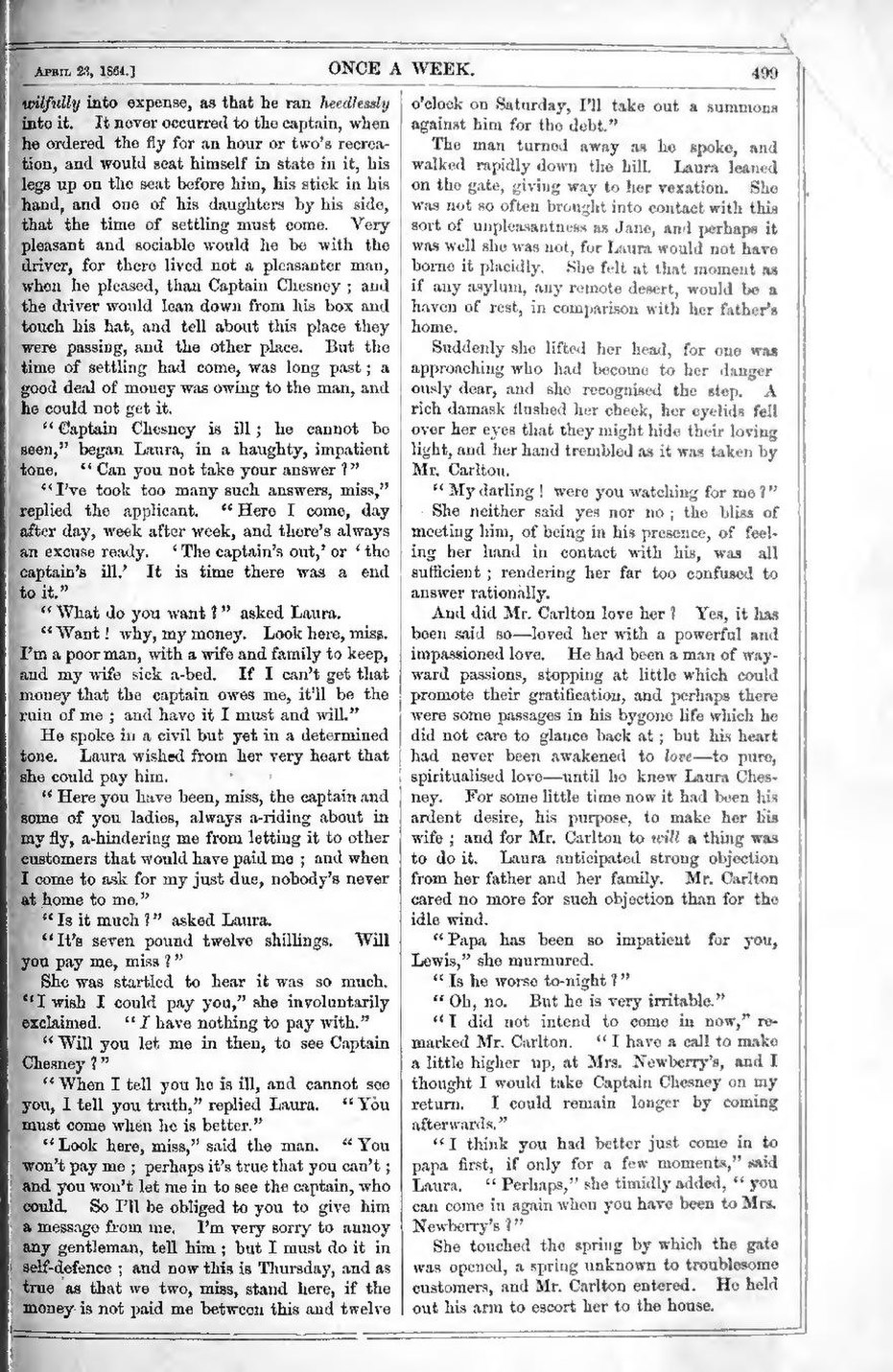wilfully into expense, as that he ran heedlessly into it. It never occurred to the captain, when he ordered the fly for an hour or two’s recreation, and would seat himself in state in it, his legs up on the seat before him, his stick in his hand, and one of his daughters by his side, that the time of settling must come. Very pleasant and sociable would he be with the driver, for there lived not a pleasanter man, when he pleased, than Captain Chesney; and the driver would lean down from his box and touch his hat, and tell about this place they were passing, and the other place. But the time of settling had come, was long past; a good deal of money was owing to the man, and he could not get it.
“Captain Chesney is ill; he cannot be seen,” began Laura, in a haughty, impatient tone, “Can you not take your answer?”
“I’ve took too many such answers, miss,” replied the applicant. “Here I come, day after day, week after week, and there’s always an excuse ready. ‘The captain’s out,’ or ‘the captain’s ill.’ It is time there was a end to it.”
“What do you want?” asked Laura.
“Want! why, my money. Look here, miss. I’m a poor man, with a wife and family to keep, and my wife sick a-bed. If I can’t get that money that the captain owes me, it’ll be the ruin of me; and have it I must and will.”
He spoke in a civil but yet in a determined tone. Laura wished from her very heart that she could pay him.
“Here you have been, miss, the captain and some of you ladies, always a-riding about in my fly, a-hindering me from letting it to other customers that would have paid me; and when I come to ask for my just due, nobody’s never at home to me.”
“Is it much?” asked Laura.
“It’s seven pound twelve shillings. Will you pay me, miss?”
She was startled to hear it was so much.
“I wish I could pay you,” she involuntarily exclaimed. "I have nothing to pay with.”
“Will you let me in then, to see Captain Chesney?”
“When I tell you he is ill, and cannot see you, I tell you truth,” replied Laura. “You must come when he is better.”
“Look here, miss,” said the man. “You won’t pay me; perhaps it’s true that you can’t; and you won’t let me in to see the captain, who could. So I’ll be obliged to you to give him a message from me. I’m very sorry to annoy any gentleman, tell him; but I must do it in self-defence; and now this is Thursday, and as true as that we two, miss, stand here, if the money is not paid me between this and twelve o’clock on Saturday, I’ll take out a summons against him for the debt.”
The man turned away as he spoke, and walked rapidly down the hill. Laura leaned on the gate, giving way to her vexation. She was not so often brought into contact with this sort of unpleasantness as Jane, and perhaps it was well she was not, for Laura would not have borne it placidly. She felt at that moment as if any asylum, any remote desert, would be a haven of rest, in comparison with her father’s home.
Suddenly she lifted her head, for one was approaching who had become to her dangerously dear, and she recognised the step. A rich damask flushed her cheek, her eyelids fell over her eyes that they might hide their loving light, and her hand trembled as it was taken by Mr. Carlton.
“My darling! were you watching for me?”
She neither said yes nor no; the bliss of meeting him, of being in his presence, of feeling her hand in contact with his, was all sufficient; rendering her far too confused to answer rationally.
And did Mr. Carlton love her? Yes, it has boen said so—loved her with a powerful and impassioned love. He had been a man of wayward passions, stopping at little which could promote their gratification, and perhaps there were some passages in his bygone life which he did not care to glance back at; but his heart had never been awakened to love—to pure, spiritualised love—until he knew Laura Chesney. For some little time now it had been his ardent desire, his purpose, to make her his wife; and for Mr. Carlton to will a thing was to do it. Laura anticipated strong objection from her father and her family. Mr. Carlton cared no more for such objection than for the idle wind.
“Papa has been so impatient for you, Lewis,” she murmured.
“Is he worse to-night?”
“Oh, no. But he is very irritable.”
“I did not intend to come in now,” remarked Mr. Carlton. “I have a call to make a little higher up, at Mrs. Newberry’s, and I thought I would take Captain Chesney on my return. I could remain longer by coming afterwards.”
“I think you had better just come in to papa first, if only for a few moments,” said Laura. “Perhaps,” she timidly added, “you can come in again when you have been to Mrs. Newberry’s?”
She touched the spring by which the gate was opened, a spring unknown to troublesome customers, and Mr. Carlton entered. He held out his arm to escort her to the house.
